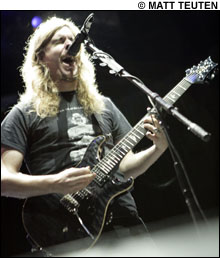
INDEFENSIBLE: At liberty in the zone of the untasteful, these Swedes have pulled off great victories of artistic integration.
|
There was a kid stalking the circumference of the crowd during Opeth’s set at Bank of America Pavilion two Fridays ago, on a solo path between the bright beer tents and the autumnal vacancy of the evening, past the booth where you could buy a coupon for a signed copy of the next as-yet-untitled Megadeth album, a prickling indignant teen male chanting, “O-peth sucks! O-peth sucks!” He didn’t seem particularly committed to this sentiment — he was broadcasting it, in fact, with the loud disinterest of an old-school newspaper boy — but still, I felt abused. Stockholm’s Opeth were my reason for being at the “shred fest” of this year’s Gigantour, and Opeth love is a shy and regressive thing: guilty, luxurious, enclosed in heavy gothic drapery. Swedish death-proggers with 15-minute songs, swishy acoustic interludes, and an album called My Arms Your Hearse (Century Media, 1998) — there’s something grandly indefensible about this band. “Decrepit body wearing transparent skin/Inside, the smoke of failure,” sings Mikael Akerfeldt in “Beneath the Mire” (from last year’s Ghost Reveries). Yes, on this one the nay-sayer goes unchallenged. You don’t get in a fistfight over Opeth — you wilt, and shed a few petals.
By contrast, over the next band, Lamb of God, from Richmond, Virginia, you could readily chuck a couple of right-handers. You could readily “throw down,” as Randy Blythe would have it, chimp-roaming across the lip of the stage with his jaw thrust out and his hands hanging heavy: “ALRIGHT! We are back in BOSTON because you motherfuckers know how to THROW DOWN!” Blythe is the tip-top post-Anselmo frontman: short-haired performing beast and ringmaster of the metal circus. He can howl the howl, and then he can put on his top hat and distribute the cheese. “Remember Boston, you’re never alone — WALK WITH ME IN HELL!” He disparages all the “fuckers in the pop-music industry” (no!), makes ungallant remarks about Britney Spears (surely not!), and when doing the hardcore tantrum bounce he gets those knees right up under his chin. And the music produced by his band, the grim phalanx of beards behind him, is the distilled zealotry of the tribe: Slayer scream, Pantera wallop, all lathed to bully-metal perfection. Not my cup of tea. But the kids at the Pavilion were open-mouthed with rapture, a strobe-lit worshipping horde. “Now You’ve Got Something To Die For” — what a genius song title for a generation of agnostic fanatics in hooded sweatshirts.
But if Lamb of God are state-of-the-art, what are Opeth? Megadeth’s Dave Mustaine, headliner/curator of Gigantour, which started last year and has already spawned a CD and a DVD compilation (both on Image) for those who’d like to relive the experience, seems to have a sturdily populist approach to the line-up. He gets a little something on there for everyone. Overkill for the vintage thrashers, Arch Enemy for the, uh, Arch Enemy fans. On this year’s bill, Opeth occupied roughly the position held last year by Dream Theater, catering to the perennial metal appetite for the symphonic, the grandiose, the empurpled. Dream Theater, however, are a frigging nightmare of drumstick-twirling vibrato prog bombast — I saw them last year and almost collapsed with rock-critical spleen — whereas Opeth are the cat’s pajamas.
Rooted not in Yes’s Tales from Topographic Oceans but in the most bituminous Scandinavian black metal, Opeth have progressed out of that scene, over a decade or so, to a point of total, regal solitude: the one band who have succeeded in gathering the blastbeats and the death belch into a broader tradition of epic, melodic rock. Other bands have been working on this — there’s Poland’s Behemoth, and of course Florida’s Egypto-incinerators, Nile, all crazed from staring too long into the eye of Horus — but Opeth alone have made the break into actual songwriting, as opposed to the Masonic construction of towering riff temples. “Windowpane,” one of the four songs they performed at Gigantour, is almost metal-free, an unplugged, rhythmically taut ballad of urban anomie such as your favorite indie-rocker might be proud of. Only a sense of quivering, exquisite, near-painful restraint in the music betrays the fact that it is the work of death-drenched longhairs who are an inch away from going WHHOOOOARRRR!!!
Mikael Akerfeldt is the Jekyll-and-Hyde vocalist; he croons, he beguiles, and then he roars like a man vomiting in a cathedral. The guttural blurt that is the signature of extreme metal is for Opeth a dramatic — almost a narrative — device: a power surge, a puff of hellfire that rolls across the calmer passages of the music. Arena death: who could have foreseen it? Akerfeldt himself seems a dry and witty fellow, with a weedy moustache and a pleasantly rich speaking voice: “Hush now,” he said from the stage. “Don’t talk to your friends. Opeth is in town. And we are here to bring you some death-metal moments . . . and some black-metal moments . . . and some cock rock . . . ” His band, too, can switch with no diminution of tension from double-kickdrum overload to brushed, frowning chords and Tool-like tapping of the tablas. Not grungy mood swings but orchestrated transitions that express the eventful topography of the Opeth world: the pits, the peaks, the plains.
ADVERTISEMENT
 |